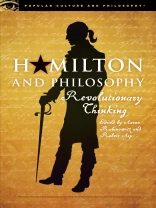In Hamilton and Philosophy, professional thinkers expose, examine, and ponder the deep and controversial implications of this runaway hit Broadway musical. One cluster of questions relates to the matter of historical accuracy in relation to entertainment. To what extent is Hamilton genuine history, or is it more a reflection of America today than in the eighteenth century? What happens when history becomes dramatic art, and is some falsification of history unavoidable? One point of view is that the real Alexander Hamilton was an outsider, and any objective approach to Hamilton has to be that of an outsider. Politics always involves a debate over who is on the margins and who is allowed into the center. Then there is the question of emphasizing Hamiltonâs revolutionary aspect, when he was autocratic and not truly democratic. But this can be defended as presenting a contradictory personality in a unique historical moment. Hamiltonâs character is also one that blends ambition, thirst for fame, and concern for his immortal legacy, with inability to see his own limitations, yet combined with devotion to honor and the cultivation of virtue. Hamiltonâs evident ambition led him to be likened to Macbeth and Shakespearean tragedy can explain much of his life.
Tentang Penulis
Aaron Rabinowitz: Aaron Rabinowitz teaches Theater and Tai Chi in New York City. He holds a Masters degree in Philosophy from Colorado State University.Robert Arp: Robert Arp holds a Ph.D. in Philosophy. He is the author of Scenario Visualization (2008) and co-author of three books including What’s Good on TV (2011) and Philosophy De MYSTifie D (2001). He is the editor of 1001 Ideas that Changed the Way We Think (2013) and co-editor of at least a dozen other books, including Batman and Philosophy (2008), South Park and Philosophy: You Know I Learned Something Today (2006), and Breaking Bad and Philosophy (2012).












